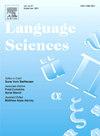更多的是手势而不是(分析师)的眼睛?从应用语言学和心理治疗的角度探讨网络手势丢失问题
IF 1.1
2区 文学
Q2 EDUCATION & EDUCATIONAL RESEARCH
引用次数: 0
摘要
当我们的社交和专业口语活动被屏幕技术(如视频会议平台)所调节时,手势会发生什么?在与这个问题争论的各种研究领域中,本文并列列出了两个领域。应用语言学和心理治疗在各自领域演讲活动的目的和从业者的动机上有所不同,但他们的专业活动都强调语言、沟通、参与、主体间性、关系不对称以及能力或技能。这两个领域都与与他人在一起的有意义的情况密切相关。他们对手势投入了相当多的关注,但却是通过不同的概念和方法透镜来做的,这使得他们关于在线手势的不同结论具有比较价值。在应用语言学家发现手势“损失”、“不可能”、“缺席”和“近乎不存在”的地方,心理治疗师发现的不仅是消极的,还有手势“放大”、“增加”、“亲近”、“增强”和“过载”。本文探讨了不同的学科视角,询问手势的含义及其在这些不同研究领域内和跨领域的在线损失(或放大)标准。本文章由计算机程序翻译,如有差异,请以英文原文为准。
More to gesture than meets the (analyst's) eye? Querying the problem of online gestural loss from applied linguistics and psychotherapy perspectives
When our social and professional spoken language activities become mediated by a screen technology, such as videoconferencing platforms, what happens to gesture? Out of the various research domains that have contended with this question, two are juxtaposed in this paper. Applied linguistics and psychotherapy differ as to the purpose of their field's speaking activities and the motivations of their practitioners, yet their professional activities share an emphasis on language, communication, participation, intersubjectivity, relational asymmetries, and ability or skill. Both domains are deeply concerned with the meaningful situation of being with others. They devote considerable attention to gesture, yet do so through different conceptual and methodological lenses, making their divergent conclusions about online gesture valuable to compare. Where applied linguists are finding gestural ‘loss’, ‘impossibility’, ‘absence’, and near ‘non-existence’, psychotherapists find not only negatives but also gestural ‘amplification’, ‘increase’, ‘closeness’, ‘enhancement’ and ‘overload’. This paper explores the different disciplinary lenses at play, asking what is meant by gesture and its criteria for online loss (or amplification) within and across these different domains of research.
求助全文
通过发布文献求助,成功后即可免费获取论文全文。
去求助
来源期刊

Language Sciences
Multiple-
CiteScore
2.90
自引率
0.00%
发文量
38
期刊介绍:
Language Sciences is a forum for debate, conducted so as to be of interest to the widest possible audience, on conceptual and theoretical issues in the various branches of general linguistics. The journal is also concerned with bringing to linguists attention current thinking about language within disciplines other than linguistics itself; relevant contributions from anthropologists, philosophers, psychologists and sociologists, among others, will be warmly received. In addition, the Editor is particularly keen to encourage the submission of essays on topics in the history and philosophy of language studies, and review articles discussing the import of significant recent works on language and linguistics.
 求助内容:
求助内容: 应助结果提醒方式:
应助结果提醒方式:


